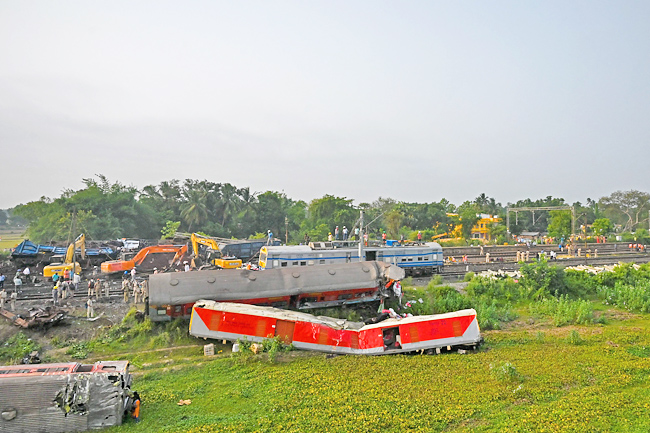AFP – The cause of India’s deadliest train disaster in decades was linked to the signal system, the railway minister said yesterday, as families scoured hospitals and morgues for missing relatives and deaths were expected to top 288.
Mounds of debris were piled high at the site of Friday night’s crash near Balasore, in the eastern state of Odisha, as workers repairing the tracks cleared the smashed carriages and blood-stained wreckage where hundreds were also injured.
Hospitals have been overwhelmed by the number of casualties.
“We have identified the cause of the accident and the people responsible for it,” India’s Railway Minister Ashwini Vaishnaw told news agency ANI. He said it was “not appropriate” to give details before a final investigation report.
There was confusion about the exact sequence of events but reports cited railway officials saying a signalling error had sent the Coromandal Express running south from Kolkata to Chennai onto a side track.
It slammed into a freight train and the wreckage derailed an express running north from India’s tech hub Bengaluru to Kolkata that was also passing the site.

Director general of Odisha Fire Services Sudhanshu Sarangi said the death toll stood at 288 but was expected to rise further, potentially approaching 380.
Odisha’s chief secretary Pradeep Jena confirmed that about 900 injured people had been hospitalised.
Vaishnaw said the “change that occurred during electronic interlocking, the accident happened due to that”, referring to a technical term for a complex signal system designed to stop trains colliding by arranging their movement on the tracks.
“Whoever did it, and how it happened, will be found out after proper investigation,” he said.
Local media have quoted a preliminary investigation report, with the Times of India reporting yesterday that “human error in signalling may have caused the collision between three trains”.
Prime Minister Narendra Modi visited the crash site and injured passengers in hospital on Saturday and said “no one responsible” would be spared.
“I pray that we get out of this sad moment as soon as possible,” he told state broadcaster Doordarshan.
The rescue effort was declared over on Saturday evening after emergency personnel had combed the mangled wreckage for survivors and laid scores of bodies beside the tracks.
A high school close to the crash site was turned into a makeshift morgue, but officials said many of the bodies were so disfigured that several distraught families could only identify their loved ones by pieces of jewellery.
“There were bodies with only a torso, an entirely burnt face, disfigured skull and no other visible identity markers left,” said Ranajit Nayak, the police officer in charge of releasing the bodies at the school.
In sweltering heat, unidentified bodies were being transferred to bigger centres and officials suggested some would only be identified by DNA testing.
Mohammad Abid, 35, said his 18-year-old son had somehow survived the crash without injuries but he was looking for his cousin, who had been travelling with him.
“I want to know how two trains were allowed on the same track… someone should be punished for this,” Abid said.
Grief-stricken Vishwanath Sahni, 47, was searching for his 26-year-old son Manoj Kumar, who had been travelling to Chennai for work in the textile industry.
He was waiting at a morgue after touring every hospital that he could. “I don’t know if I’ll find my son,” he said.
Beside him waited his friend Mahender Yadav, 60, whose two sons travelling with Kumar were recovering in hospital. “One of them has serious injuries but I know that they are in a hospital and doctors will do their best,” Yadav said.
Authorities said every hospital between the crash site and the state capital Bhubaneswar, around 200 kilometres away, had received victims.
India has one of the world’s largest rail networks and has seen several disasters over the years, the worst of them in 1981 when a train derailed while crossing a bridge in Bihar and plunged into the river below, killing between 800 and 1,000 people.
Friday’s crash ranks as its third worst and the deadliest since 1995, when two express trains collided in Firozabad, near Agra, killing more than 300 people.






